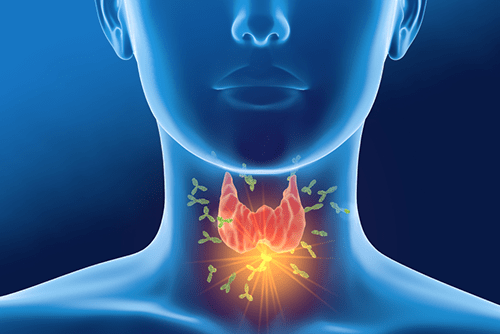The thyroid hormone is the hormone that makes sure that our body keeps moving and pushing through the day. It is responsible for maintaining our body’s metabolism and energy levels. The butterfly-shaped thyroid gland located at the lower anterior part of the neck produces this thyroid hormone. When this gland malfunctions, it either produces too much or too little thyroid hormone. Both hypothyroidism and hyperthyroidism come with multiple symptoms including the inability to burn fat without Free T3.
Hashimoto thyroiditis is an autoimmune disease that leads to an underactive thyroid. Hashimoto’s thyroiditis is a form of hypothyroidism. The term autoimmune means that the body’s immune system attacks the thyroid gland cells, thus lowering the function of the hormone. Thyroid peroxidase antibody or TPO is the antibody that is elevated in Hashimoto’s Thyroiditis and is responsible for the oxidation of iodine. Iodine is a very important mineral when it comes to optimal thyroid function. When TPO is elevated it’s a market that says that there is damage happening and indicates an immune process is occurring. Although, The exact cause of Hashimoto’s Thyroiditis is not known. But what is known is that it can arise from a combination of genetic and environmental elements. However, there are also specific factors that increase the risk of Hashimoto’s thyroiditis.
RISK FACTORS
- Sex: the incidence is much more common in women than in men.
- Age: it most commonly affects middle-aged individuals between ages 40 and 60. However, it can also occur in teens and young women.
- Genetics: you are much more likely to develop Hashimoto’s thyroiditis if you are a first-degree relative of a person with this autoimmune disorder. There is a genetic link and tends to run within families.
- If you have another pre-existing autoimmune disease: such as type 1 diabetes mellitus, rheumatoid arthritis, celiac disease (gluten intolerance), vitiligo, or lupus, and many other autoimmune disorders, it increases your chance of developing other autoimmune disorders like Hashimoto’s Thyroiditis.
- Radiation exposure: exposure to excessive amounts of radiation (whether environmental or due to treatment) increases the chances of acquiring Hashimoto’s thyroiditis.

SIGNS AND SYMPTOMS
There are no unique signs and symptoms of Hashimoto thyroiditis. But, unexplained symptoms that have not improved with traditional approaches may require further testing for Hashimoto’s Thyroiditis.
Fatigue weight gain
- constipation
- dry, pale skin, brittle nails, hair loss
- increased sensitivity to cold
- depression, increasing forgetfulness
- muscles aches, joint pain
- reduced exercise tolerance
- irregular or heavy menses
HASHIMOTO THYROIDITIS IN WOMEN

Since Hashimoto thyroiditis is much more common in women than in men, this means that it can affect and present differently in women. There is a close association between the female reproductive hormones and the thyroid hormone. For this reason, when the thyroid hormone levels begin to fall, the menstrual cycle becomes irregular, often being mistaken for early menopause. Additionally, it does not help that the symptoms of Hashimoto’s thyroiditis (or any other form of hypothyroidism) are similar to menopausal symptoms, this makes it all the more confusing for a woman experiencing these symptoms.
In teens, low thyroid hormone levels can cause a delay in the onset of puberty. Due to the erratic fluctuations in hormone levels, fertility may be affected. It may become difficult getting pregnant due to anovulatory or irregular menstrual cycles. There may also be problems with pregnancy due to low thyroid levels, such as miscarriages or birth defects.
However, it is essential to know that these female reproductive problems only arise if Hashimoto’s thyroiditis remains untreated or hormone levels remain low due to inadequate treatment.
TREATMENT
The treatment of Hashimoto’s thyroiditis is pretty straightforward. Since the body cannot internally produce the thyroid hormone, the solution is to provide it with an external source through diet and food as number 1, there is a role for medication and a role for supplements. You first have to make the diagnosis.
WHAT CAN YOU DO?
It is scary when your body begins to experience the symptoms of hypothyroidism. Some might dismiss it at first, believing that the body must be going under stress, enduring the consequences of a rough week. But it does become worrisome when these symptoms persist, and your body cannot bounce back even after you lovingly care for it. And this is when you should reach out to a healthcare professional who specializes in treating Hashimoto’s thyroiditis. Thus schedule an appointment with me today! Click here

